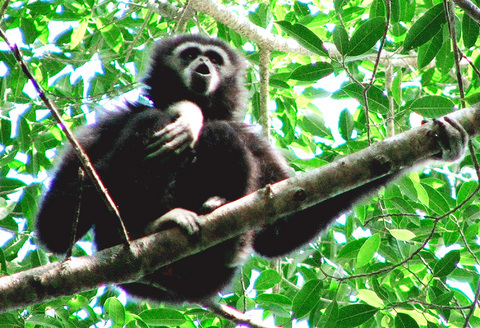Gibbons living in Thailand have been found to communicate threats from predators by singing -- the first time the behavior has been discovered among non-human primates, researchers said yesterday.
While other animals have been shown to use song to attract mates or signal danger, researchers writing in this month's journal PLoS said their study was the first to show gibbons -- a slender, tree-dwelling ape -- issuing song-like warnings to each other.
"This work is a really good indicator that non-human primates are able to use combinations of calls ... to relay new and, in this case, potentially lifesaving information to one another," said Esther Clarke, a University of St. Andrews graduate student and co-author of the study.

PHOTO: AP
"This type of referential communication's commonplace in human language, but has yet to be widely demonstrated in some of our closest living relatives -- the apes," she said.
Clarke along with Klaus Zuberbuhler from St. Andrews in Scotland and Ulrich Reichard of the Max Planck Institute in Germany spent 2004 and last year at Khao Yai National Park in Thailand observing groups of white-handed gibbons.
Gibbons live in the treetops and are renowned for their elaborate hooting sounds that echo across the forest for up to 1km to advertise pair bonds or attract mates.
To test the primates response to danger, the team conducted a series of experiments in which they placed models of predators -- snow leopards, pythons and crested serpent eagles -- near a group and then made audio recordings of their response.
What they found, Clarke said, is that the gibbons approached the potential predator and began uttering a series of sounds -- "wa's, wow's and hoo's'' sounding similar to a bird -- that were picked up by other gibbons, who then repeated the calls to others.
The sounds made when encountering a predator were more chaotic and louder than those used to win over a mate, Clarke said.
"Gibbons can rearrange their songs to denote different circumstances, much like we do with words," she said.

FRUSTRATIONS: One in seven youths in China and Indonesia are unemployed, and many in the region are stuck in low-productivity jobs, the World Bank said Young people across Asia are struggling to find good jobs, with many stuck in low-productivity work that the World Bank said could strain social stability as frustrations fuel a global wave of youth-led protests. The bank highlighted a persistent gap between younger and more experienced workers across several Asian economies in a regional economic update released yesterday, noting that one in seven young people in China and Indonesia are unemployed. The share of people now vulnerable to falling into poverty is now larger than the middle class in most countries, it said. “The employment rate is generally high, but the young struggle to

STEPPING UP: Diminished US polar science presence mean opportunities for the UK and other countries, although China or Russia might also fill that gap, a researcher said The UK’s flagship polar research vessel is to head to Antarctica next week to help advance dozens of climate change-linked science projects, as Western nations spearhead studies there while the US withdraws. The RRS Sir David Attenborough, a state-of-the-art ship named after the renowned British naturalist, would aid research on everything from “hunting underwater tsunamis” to tracking glacier melt and whale populations. Operated by the British Antarctic Survey (BAS), the country’s polar research institute, the 15,000-tonne icebreaker — boasting a helipad, and various laboratories and gadgetry — is pivotal to the UK’s efforts to assess climate change’s impact there. “The saying goes

ENERGY SHIFT: A report by Ember suggests it is possible for the world to wean off polluting sources of power, such as coal and gas, even as demand for electricity surges Worldwide solar and wind power generation has outpaced electricity demand this year, and for the first time on record, renewable energies combined generated more power than coal, a new analysis said. Global solar generation grew by a record 31 percent in the first half of the year, while wind generation grew 7.7 percent, according to the report by the energy think tank Ember, which was released after midnight yesterday. Solar and wind generation combined grew by more than 400 terawatt hours, which was more than the increase in overall global demand during the same period, it said. The findings suggest it is

TICKING CLOCK: A path to a budget agreement was still possible, the president’s office said, as a debate on reversing an increase of the pension age carries on French President Emmanuel Macron yesterday was racing to find a new prime minister within a two-day deadline after the resignation of outgoing French Prime Minister Sebastien Lecornu tipped the country deeper into political crisis. The presidency late on Wednesday said that Macron would name a new prime minister within 48 hours, indicating that the appointment would come by this evening at the latest. Lecornu told French television in an interview that he expected a new prime minister to be named — rather than early legislative elections or Macron’s resignation — to resolve the crisis. The developments were the latest twists in three tumultuous